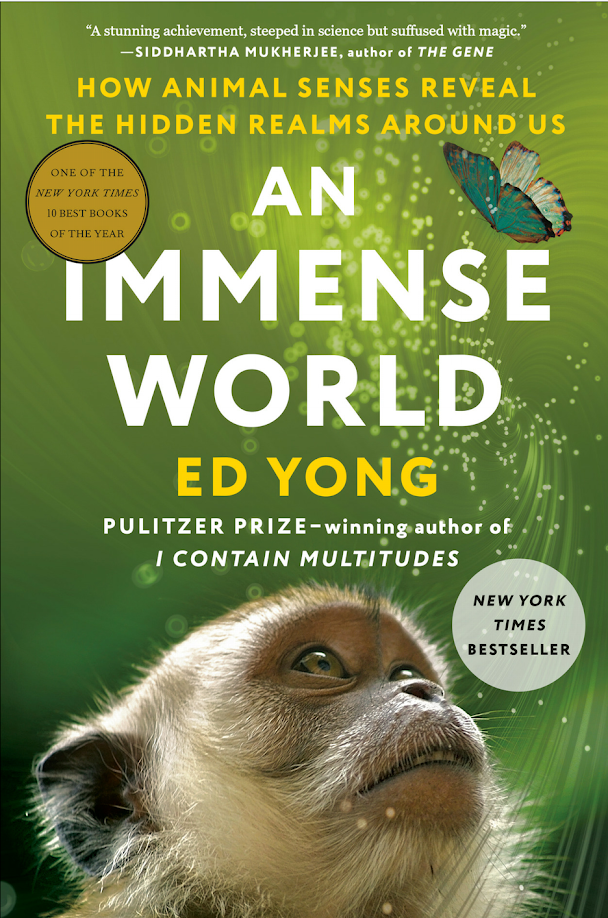As usual, I have my schnozz stuck in another book.
I read serially.
No, not just when I'm eating Cheerios. I mean when I finish one book, I barely pause before going on to the next. It seems to me though our species appears to be hurtling into the dark ages, there is an efflorescence of great books. Scarcely a week goes by when I don't buy two or three.
Accumulation is easier nowadays, too. My New York City apartment--large for Manhattan--is stuffed floor to ceiling with books. Since I finally conceded I had no more space, I switched to ebooks. And though something is lost reading on a device, much is gained. Mainly space. Oh, yeah. And lack of a divorce.
I'm a couple days into Pulitzer-Prize winner Edward Yong's new book, "An Immense World: How Animal Senses Reveal the Hidden World Around Us." You can read the Times' review here. And you can buy the book here.
I have wide-ranging interests which is why I read in such a wide-ranging manner. Everything from the origin of our species to ancient human history to the wars of annihilation that we seem to have fought with such regularity throughout time. But regardless of what they're about, most of the books I read inform not only my world view, but my view of advertising and how people communicate.
Early on Yong references a centuries-old idea put forward by a Baltic-German zoologist called Jacob von Uexkull. (Bear with me now, this won't end up as strangely as it's beginning.) In looking at animal behavior Yong uses von Uexkull's world "Umwelt." Broadly, umwelt means environment, but more specifically, Yong and von Uexkull use it to mean an animal's sensory bubble or perceptual world.
All animals use their senses differently--and effectively. From dogs, whose apostrophe-shaped nostrils send aromas right to their sense organs, to dolphins who can sense the actual skeletons inside fish, every species is different. For too long, humankind, with our notion of dominion over the planet and its inhabitants, have looked at other species as not just different, but somehow inferior to us.
The key to understanding the world around us is the key to creating good, effective advertising.
The key is empathy.
Every species has its reasons. To diminish a snake because it senses the world with its tongue, or to diminish an elephant because it can't see color is to be patently non-empathic.
I've seen too many people in our business way too often not take the time or have the patience to consider how those other than the cool kids live. They seem to actually believe that Williamsburg is the measure of all things and those with other belief systems, values or codes are somehow risible.
As someone who spent half of a long career working on b-to-b accounts, I heard virtually everyone and his cousin say how they're boring and uncool. Likewise, in our current benighted era I've heard how only men can work on a muscle car, only young people can do something for young people, and only women can work on products for women.
This will probably earn me a fair amount of rebuke, but I believe that this sort of categorization is harmful to us all. It's understandingness that leads to understanding, not just wearing the same clothing, having similar biology or coming from an adjacent zip code.
It's Umwelt--understanding and appreciating and empathizing with another's sensory bubble--that makes a communication kind and real and true and moving. It's looking at people and situations and other species not through your eyes but working hard to see through their eyes that leads to real connection.
So much of what I see in the world is false.
As Einstein is said to have said, "Everyone is a genius. But if you judge a fish by its ability to climb a tree, it will live its whole life believing that it is stupid."
I think as an industry we have for too long looked at people as if they are abstractions--personas, archetypes or focus-group respondents--a portrait in a badly-written powerpoint deck. I'm not sure that we have the compassion we need to be welcomed into people's homes and lives and minds.
Not just advertising, of course, but brands, too. And how we treat each other--especially outsiders, because everyone's an outsider sometimes.
I don't read books on advertising to learn about advertising.
I read books on life to learn about life.
And then I try to apply that to advertising.
That's an odd strategy I know.
But it works about half the time. Or not.

No comments:
Post a Comment